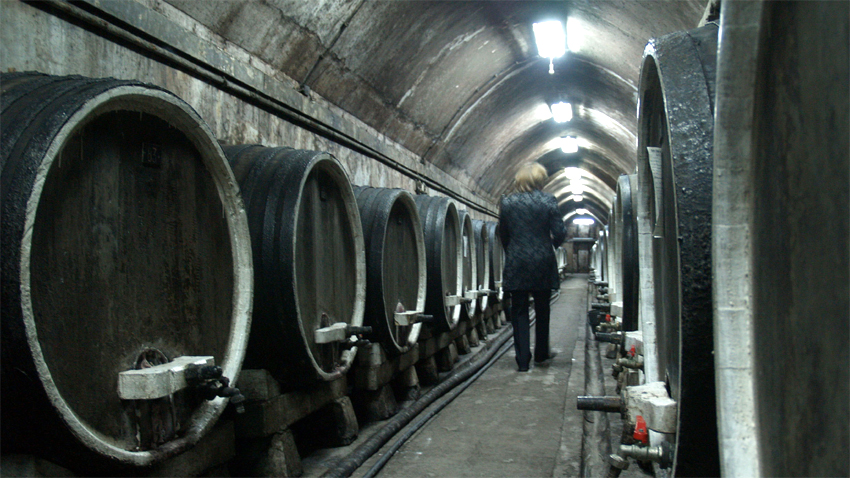On February 1, according to the new Gregorian calendar introduced in Bulgaria in 1968 as well as on February 14, according to the old style dating, Bulgaria marks the Vine and Wine Day (Trifon Zarezan or Saint Trifon the Pruner). The men prune the vines on this day to prepare them for the forthcoming spring. Wine has been produced and consumed on the Bulgarian lands since time immemorial. The Thracians, who were the oldest population on these lands, were among the most celebrated wine-makers of antiquity. The tradition of wine making is still alive nowadays.
Bulgaria has never produced better wines, claims Radoslav Radev, Chairman of the National Vine and Wine Chamber, adding that a real revolution has happened in this sector over the recent years financed to a great extent by the EU Common Agricultural Policy. Thus, most of the aging vine massifs were renewed and the production technologies modernized.
“We have registered great progress in the way vineyards are planted and grown”, says Mr Radev. Lots of money was invested in modern technologies. The Bulgarian wine now has a completely new face. We offer good proportion between price and quality, excellent wines with a great design and history. The challenge now is to spread this news successfully abroad."
The golden times of Bulgarian wine of the 1970’s and 1980’s, when Bulgaria was the 5th and the 6th biggest exporter of wine, are not very likely to return. The massive penetration of Argentina, Chile, Australia and New Zealand to the world wine market broke the predominance of traditional wine-producers such as France, Italy and Spain.
Meanwhile, Bulgaria has lived through the turbulence of the transition period toward market economy, from large-scale production and export of wine to multiple boutique wine-cellars. Bulgaria lost traditional markets in former communist states. However, it managed to spread over other markets.
“The sale of Bulgarian wine in countries such as England, Germany, the Netherlands and Belgium reached its peak in the mid 1990’s. Later, a sharp drop was marked in the wine export to these countries which was mainly due to the aggressive penetration of wines from the so-called new wine world. Even top producers such as France and Italy were affected by this trend.”
The traditions of the old wine world are combined with zeal and innovation.
“Bulgaria bears the tradition of the “Old wine world” in the wine-making field. However, this sector has acquired the innovative spirit of the wines manufactured in the so-called “New wine world”, contends the chairman of the National Vine and Wine Chamber”.
According to Radoslav Radev, the highest interest towards the wines produced in the “New wine world” was registered shortly after 2000, followed by a return to the traditional wine-making countries.

The Bulgarian wine-manufacturing has been gradually reviving and returning its traditional markets.
“Russia is again Bulgaria’s biggest wine market. We used to sell the largest quantities of Bulgarian wine on this market in the past. The good news is that Bulgaria has regained its market in the average and the high price segment there. The same thing refers to the Polish and the Czech market. We managed to step back on these markets and sell successfully our produce. In the past, one-third of the wine market in Poland consisted of Bulgarian wines. Bulgaria used to sell more wine there than Italy, France and Spain altogether. Currently we are slowly regaining our position there. Meanwhile, the Bulgarian wine is slowly shifting from the low price segment to the medium and the high ones.”
A similar trend exists on other traditional markets in Western Europe. Bulgaria sells less, but more expensive wines there. The industry has the chance to penetrate large and new markets such as China and India. The wine export to China has been constantly on the rise over the past years. Bulgaria also attempts at positioning its wines in the USA, Switzerland, Singapore, Japan, Vietnam and China, within the frameworks of the EU programme for promotion of wines in third countries.
The local wine sorts were neglected over the past decades when the curiosity of the Bulgarian producers and consumers towards foreign sorts such as Shiraz, Pinot Noir, Melbeek, etc, was huge. Now the country has the chance to find its niche in the world wine market with traditional vine sorts. Bulgaria currently plants new plots with local vines such as Mavrud, Broad-leaf Melnik Vine, Pamid, and Rubin and we are to see the results in the nearest future, says Radoslav Radev.
2013 was exceptionally favorable to Bulgarian wine-making. The grape yield was very rich and of an extremely high quality. A record-high quantity of wine (around 200 million liters) is expected to be produced this year as compared to 127 million liters produced in 2012. Remember vintage 2013. It is no secret that good wines can be produced from high-quality grapes.
English version: Kostadin Atanasov
One of the key steps in the expansion of the underground gas storage at Bulgaria's Chiren gas storage facility, the construction of the above-ground infrastructure and the installation of new compressors, has already been completed, Energy Minister..
Transformation – this is the word that most accurately describes the current state of the Bulgarian industry. According to an analysis of sectoral data for the period from 2008 to the beginning of 2024, made by the Institute for..
Tourism is one of the sectors in Bulgaria ready to the greatest extent to smoothly continue working after Bulgaria joins the Еurozone , the executive director of the National Tourism Board, Dr. Polina Karastoyanova, believes. In tourism, and at this..
One of the key steps in the expansion of the underground gas storage at Bulgaria's Chiren gas storage facility, the construction of the above-ground..
Transformation – this is the word that most accurately describes the current state of the Bulgarian industry. According to an analysis..

+359 2 9336 661
